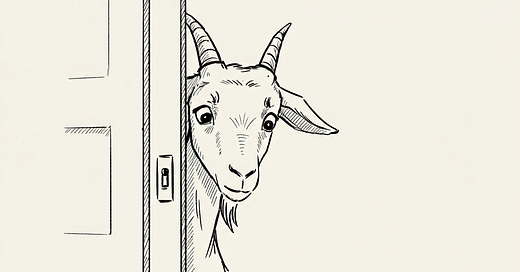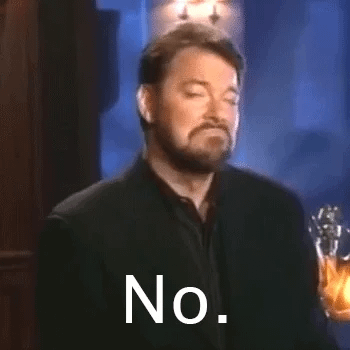There’s a whole category of things to think about, where the answer to a puzzle or question is so nonintuitive that you’re almost frustrated when you hear what it is. You can’t really convince yourself that the correct answer is true, so you sit with an uncomfortable level of cognitive dissonance for a moment.
This feeling used to bother me, but now I really enjoy trying to figure out why it’s happening.
A few weeks ago, I had my brain bent just a tiny bit.
pointed out a really interesting example of something that doesn’t seem right, but the answer just seems… well, wrong.The Monty Hall Problem! Have you heard of this? Have you written about this? I’m just working on my bit for this week and came across it and it hurts my head
I’ve mentioned it before, but I’ll say it again: I really appreciate these thoughtful little nuggets. Sometimes, the comments here are every bit as important as what I’ve written, and my own view on whatever I’ve just written will often need updating after hearing interesting additional thoughts, or tangential ideas.
Okay, so the Monty Hall Problem is named after the legendary host of the TV show Let’s Make a Deal. This show was still on the air when I was a kid, but it had started its run all the way back in 1963.
Let’s Make a Deal was just crazy. If you’ve never seen this show but you’ve seen The Price is Right, just imagine if Bob Barker had a great deal more creative freedom and a much, much smaller budget.
One skit perfectly illustrates how wild this show was. The contestant had a chance to win a car—probably the top prize of that particular show, so all eyes were on this game while it was being played. They were presented with three doors, and told their car was behind one of the doors.
Behind the other two doors were goats, with one behind each door. Ever the pragmatist, I wondered what the contestant would do with their “consolation prize”—would they take the goat home and befriend him, or would they put him out in the yard so they wouldn’t have to mow their lawn?
I digress. That’s pretty easy when we’re talking about goats.
Monty Hall would start the game by asking which door the contestant wanted to open. Given that there were three doors and the car was behind one of them, the odds of winning are trivial to calculate: one in three. That’s not bad, but what Monty did next was a lot more interesting.
After the contestant picked a door, he would leave their door unopened, but then open one of the remaining two doors, revealing a goat behind said door. Now, there were just two unopened doors: the one the contestant picked, and the one they hadn’t. Monty Hall then asked if the contestant wanted to change their pick.
In these scenarios, Monty knows what’s behind all doors.
Now, if you only have two doors, you’re thinking: obviously, the odds are 50/50 here. There’s just no sense in switching doors or not—the odds are the same with either door.
That’s what I thought, too.
Grab some coffee if you don’t already have some, and let’s dive in. Let me give you the really unsatisfying answer first, and then we can go down a rabbit hole that’s a lot more intuitive, at least for me.
When you start with three doors and pick door number one, you have a one in three chance of finding the car. Using our good friend inversion, this means that the odds of finding the car behind one of the other two doors is two in three.
It’s obvious, but stay with me! This is the key.
When Monty opens up door number 3 to reveal a goat, the probability of finding a car behind door 2 or 3 together is still two in three. It’s just that, now, we know a goat is behind door number 3.
The odds of door number 3 containing said car are now zero, since we know there’s a goat behind that door. That means the whole 2/3 probability is now concentrated behind door number 2, and there’s still a one in three chance that the car is behind door number 1.
In other words, it makes sense to switch doors every time.
Seriously. Really.
We need a clearer scenario. Instead of three doors, let’s imagine there are a million doors instead. You pick door number 420,069 just to be funny (maybe you’re not much of a “lucky number” person), and then Monty goes down the line, opening all of the remaining doors except two—door 420,069 and door 343,845.
Now, Monty asks you if you want to switch doors. What do you do?
This time, it might be a little easier to work through that probability distribution. You can intuitively see that the odds are very slim indeed that you picked the right door in the first place, even though there are now only two doors remaining. Remember: Monty knows where the car is, so he can just open all the other doors every time.
Instead of 2/3 being concentrated behind one door, all of the 999,999 in a million odds are now behind door 343,845—the door you didn’t pick. If you want to take the car home, you should change your pick.
But also: why shouldn’t a goat be considered a major award?







This is one of those frustrating problems where I instantly know what you're talking about when it's mentioned, but then I need a good moment to reread the explanation to absorb the logic...and it still makes only abstract sense. Then I forget all about it until the next time it's brought up, like today.
Monty Hall was born and raised in my hometown (Winnipeg, Manitoba, Canada).